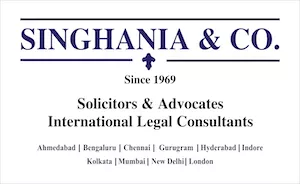- within Litigation and Mediation & Arbitration topic(s)
- within Litigation, Mediation & Arbitration, Criminal Law and International Law topic(s)
- with Finance and Tax Executives
- in United States
- with readers working within the Banking & Credit, Chemicals and Law Firm industries
INTRODUCTION
In a recent judgment, titled Bijay Agarwal v. M/s Medilines1 the Hon'ble Supreme Court of India while reiterating that "authorized signatory" of cheque on behalf of a company is not a "drawer" of the cheque clarified that such signatory cannot be directed to deposit any sum under section 148 of The Negotiable Instruments Act, 1881 ("NI Act").
FACTS OF THE CASE
The Accused Company represented to be the Pan Indian circle licence holder for distribution of Electronic Pin Recharge BSNL. The Appellant is the authorised signatory and Director of the Accused Company. The Accused Company induced the Complainant Company to become the Master Distributor for BS recharge pin for Karnataka State by paying advance amount of Rs.1,00,00,000/-. Accordingly, the Complainant Company entered in agreement with the Accused Company on 01.10.2011. The Complainant Company later found out that 99% of the BSNL E-recharge pin supplied by the Accused Company are fake and the talk time under the said BSNL E-recharge load supplied to them could not be uploaded to the mobile numbers of the customers. The Accused Company executed a Memorandum of Understanding and assured return of the amount advanced and issued five post-dated cheques. However, the cheque dishonoured upon presentation following which the Complainant Company issued a legal notice. Pursuant to the same, the Accused Company issued two fresh post-dated cheques each for a sum of Rs.25 lakhs in lieu of the old cheques. However, again, the cheques dishonoured upon presentation and returned with the endorsement "payment stopped by the drawer". Thereafter, a complaint was filed before the trial court under section 138 of the NI Act after complying with the procedure.
After perusing the facts and the evidence on record, the trial court found the Accused Company and Appellant guilty of the offence punishable under section 138 of NI Act, sentencing the Accused Company and the Appellant to pay a fine of Rs. 40,00,000/- and in case of default of payment, undergo simple imprisonment for a period of six months.
Aggrieved by the judgment and order passed by the trial court, the Accused Company and Appellant preferred appeal before the Sessions Court. In the appeal, the Accused Company and Appellant sought for suspension of sentence, under Section 389 of the Cr.PC. The Sessions Court suspended the sentence on the condition that the Accused Company and Appellant deposit 20% of the fine/compensation amount.
Against the said condition, the Appellant approached the High Court seeking quashing of the condition to deposit the fine. However, the High Court dismissed the petition and the Appellant filed a special leave petition before the Supreme Court.
CONTENTIONS OF THE APPELLANT
The Appellant primarily relied upon the decision of the Supreme Court in Shri Gurudatta Sugars Marketing Pvt. Ltd. v. Prithviraj Sayajirao Deshmukh & Ors.,1 wherein it was held that the signatory of the cheque cannot be directed to pay interim compensation payable under Section 143A of the NI Act as being the authorised signatory of the cheque by itself would not make him the drawer. The Appellant submitted that though the said decision was dealing with section 143A of the NI Act, it is applicable to his case as section 148 is analogical to section 143A. Therefore, the Appellant being the authorized signatory of the Accused Company not being the drawer of the cheque should not be directed to deposit any amount under Section 148 of the NI Act.
CONTENTIONS OF THE RESPONDENT
The Complainant Company contended that decision in Shri Gurudatta Sugars Marketing Pvt. Ltd. (supra) case is inapplicable to the case in hand.
ANALYSIS OF THE COURT
The Court, while referring to section 143A and 148 of the NI Act, noted that section 143A deals with the power of the court trying an offence under Section 138 of the NI Act to direct the drawer of the cheque to pay interim compensation to the complainant and section 148 on the other hand deals with the power of the Appellate Court to direct the drawer of the cheque to deposit such sum which shall be a minimum of 20% of the fine or compensation awarded by the trial court. Thus, both the sections provide for such directions exclusively to the 'drawer' of the cheque.
The Court referred to the earlier judgements of Supreme Court in K.K. Ahuja v. V.K. Vohra and Another2 and N. Harihara Krishnan v. Godfather Travels and Tours P. Ltd.,3 wherein it was held that the primary liability for an offence under Section 138 lies with the company and the company's management is vicariously liable only under specific conditions provided in Section 141 of NI Act. Furthermore, signatory merely authorised to sign on behalf of the company would not become the 'drawer' of the cheque for the purpose of section 143A of the NI Act and cannot be directed to pay interim compensation. The Court further held that general rule against vicarious liability in criminal law is that individuals are not typically held criminally liable for acts committed by others unless specific statutory provisions extend such liability. Section 141 of the NI Act is one such provision, extending liability to the company's officers for the dishonour of a cheque. An attempt to extend this principle to section 143A, to hold directors or other individuals personally liable for interim compensation, is unfounded. Liability under section 141 arises from the conduct or omission of the individual involved, not merely their position within the company.
Relying on these judgments, the Court allowed the appeal and held that the sum awarded by appellate courts under section 148 of the NI Act shall be in addition to any interim compensation paid by the accused under section 143A. Therefore, there can be no doubt that the term 'drawer' referred to in section 143A and 148 means 'drawer of the cheque concerned.' As such, the decision in Shri Gurudatta Sugars Marketing Pvt. Ltd. (supra) case is applicable to the case in hand to the extent it holds an officer of a company who is an authorised signatory of the cheque issued by a company is not the drawer of the cheque.
The Court also referred to the judgement in Jamboo Bhandari v. Madhya Pradesh State Industrial Development Corporation Limited and Ors.,4 wherein the Court held that an appeal against conviction under Section 138, NIA, could not place a condition to deposit an amount invoking the power under Section 148(1), NIA, mechanically without considering whether the case falls within exceptional circumstances.
CONCLUSION
Thus, the Supreme Court of India has reiterated that merely because the company authorized an officer to sign a cheque on its behalf, such officer does not become 'drawer of the cheque'. Consequently, the conditions of depositing amounts under Sections 143A and 148 of NIA, which are to be paid exclusively by the drawer of cheque, should not be imposed on such officer who was merely authorized to sign the cheque.
Footnotes
1. Shri Gurudatta Sugars Marketing Pvt. Ltd. Vs. Prithviraj Sayajirao Deshmukh & Ors., (2024) SCC OnLine SC 1800.
2. K.K. Ahuja v. V.K. Vohra and Another, (2009) 10 SCC 48.
3. N. Harihara Krishnan v. Godfather Travels and Tours P. Ltd., (2018) 13 SCC 663,
4. Jamboo Bhandari v. Madhya Pradesh State Industrial Development Corporation Limited and Ors., (2023) 10 SCC 446.
The content of this article is intended to provide a general guide to the subject matter. Specialist advice should be sought about your specific circumstances.



